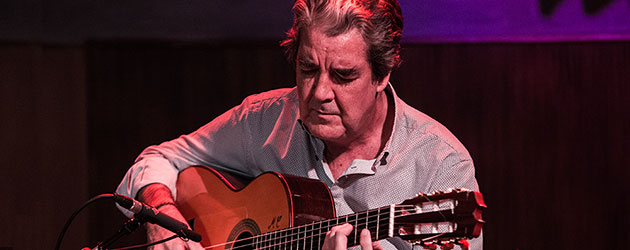José Manuel Gómez Gufi
Photos & Video: Rafael Manjavacas
Rafael Riqueni guitar
Paco Roldán, guitar
1st Festival Flamenco de Club del Café Berlín
“Spain has many cultural centers” said the much-missed Danish journalist Ebbe Traberg while inviting you to one of his favorites, a bar on the Plaza Dos de Mayo in his Madrid neighborhood of Malasaña. Traberg loved jazz and cycling. He lived through the Nazi invasion of his country and the bebop liberation worked by Dizzy Gillespie and Chano Pozo who changed his life in the 1947 tour. I once saw him in flamenco, he was acting as guide for some fellow Danes who wanted to know more about this Camarón guy.
Traberg would have loved to be in the Café Berlín Saturday night, he loved jazz clubs, and having a drink and conversation with friends, and that silence takes over in bars and bull-rings. Traberg understood that that’s CULTURE.
Rafael Riqueni in a club? A Saturday night at eleven o’clock? Everyone knows Spaniards are famous for being noisy, and silence is the greatest ally of music. In the case of Riqueni, that ally is respect.
Rafael Riqueni. A man and a guitar. His latest record, “Parque de Maria Luisa”, is devoted to his childhood memories in Seville, and while fountains and goldfish spring forth from his fingers, you can follow the concert from the bar without interference. I think it’s a miracle. Silence in flamenco is different from that of jazz, different from that silence of classical music (always punctuated with the occasional cough). In flamenco there are deafening silences exaggerated by long-distance shouts of “ole!” perpetrated by exhibitionists, quite different from the oles of encouragement from the person next to you marking the way. The truly good “oles” are the ones that come from deep inside, and those are always under the breath, like a whispered kiss. Riqueni received quite a few of those.
He had announced that he was going to interpret compositions from the recording, and then he would make them flamenco. We saw Rafael in Pamplona with his group at the Baluarte, and at the historic balcony of the “chupinazo”, with the midday sun burning down…and his music doesn’t lose its essence, that of beauty. And in the middle of it all, he broke a nail. A slight work accident that allowed us to ask for another round, and congratulate one another for being there.
RIQUENI AND HIS CIRCUMSTANCES
It’s impossible to think of Rafael Riqueni without considering his circumstances; a career weighed down by health problems (a bipolar disorder that fortunately has been overcome thanks to successful treatment), which sent him to jail with an unlucky accumulation of incidents. They tell me he had permission to play his guitar. It’s not hard to imagine the soothing effect of his music, while being holed up within the walls of a prison.
With his nail repaired, and back on stage, he kept his promise: soleá, rondeña and bulerías with the accompaniment of Paco Roldán. Rafael says his music is greatly influenced by the classical, but that alone is insufficient explanation for the sound and the beauty of his interpretations which seem wrapped in a climate of innocence able to transport us to a parallel world as if the compositions had been cleaned of any stain and/or bad experiences.
Some people might think that flamenco isn’t like that, but they’re wrong. That’s the flamenco of Riqueni in a club the first weekend of the festival del Berlín that began the previous day with Duquende. Next stop: Jerez.
